新目标2023年中考一轮教材复习 课件七年级下册 Units 10-12
文档属性
| 名称 | 新目标2023年中考一轮教材复习 课件七年级下册 Units 10-12 |

|
|
| 格式 | pptx | ||
| 文件大小 | 2.5MB | ||
| 资源类型 | 试卷 | ||
| 版本资源 | 人教新目标(Go for it)版 | ||
| 科目 | 英语 | ||
| 更新时间 | 2023-02-26 00:00:00 | ||
图片预览

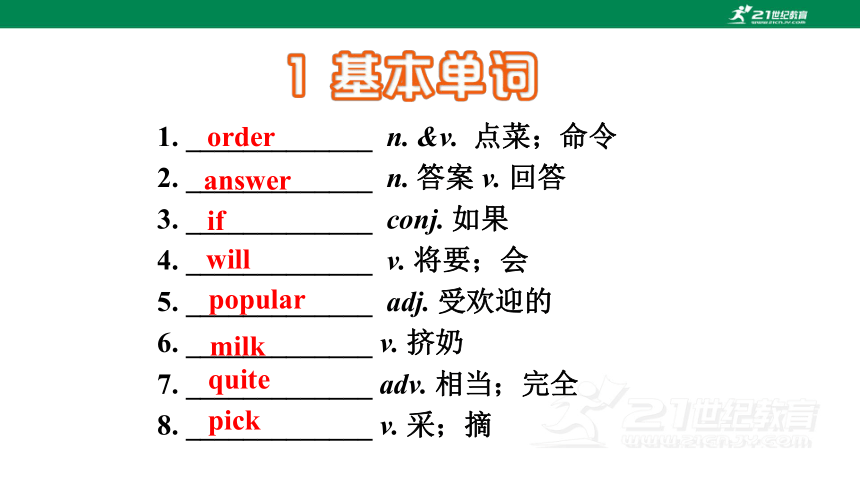
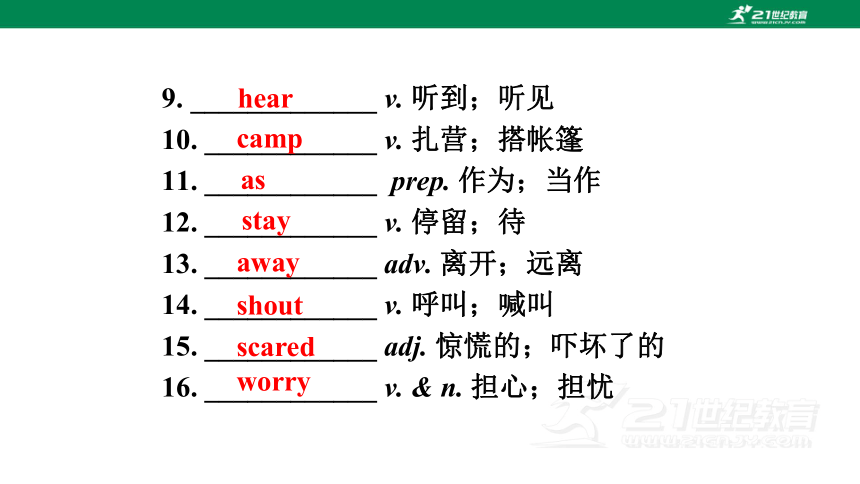
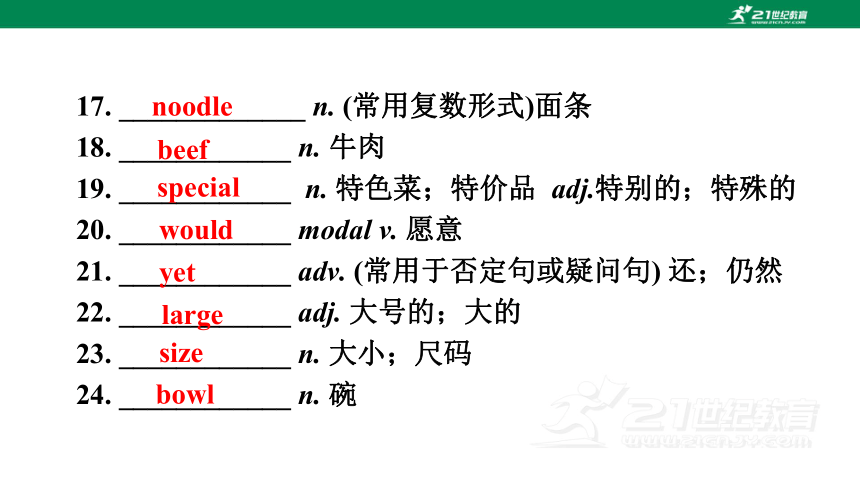
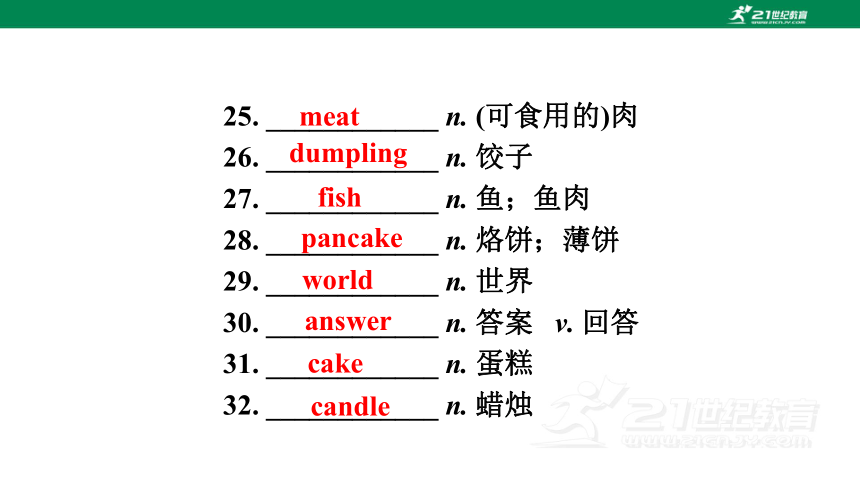
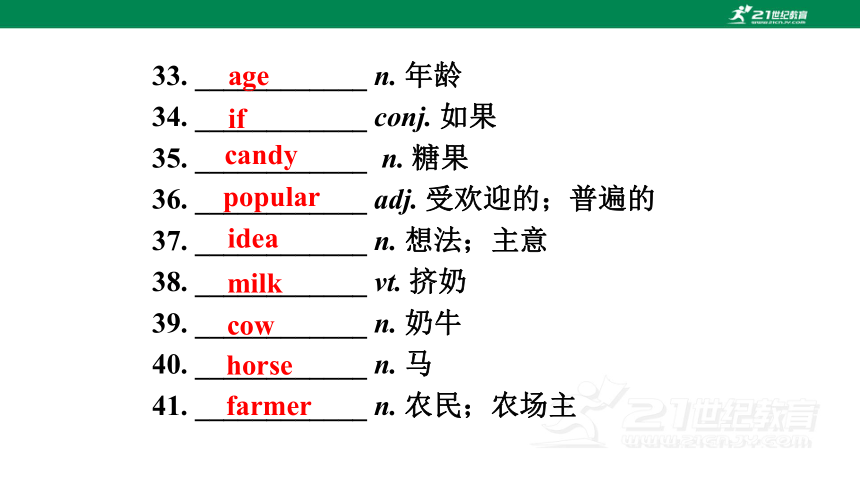

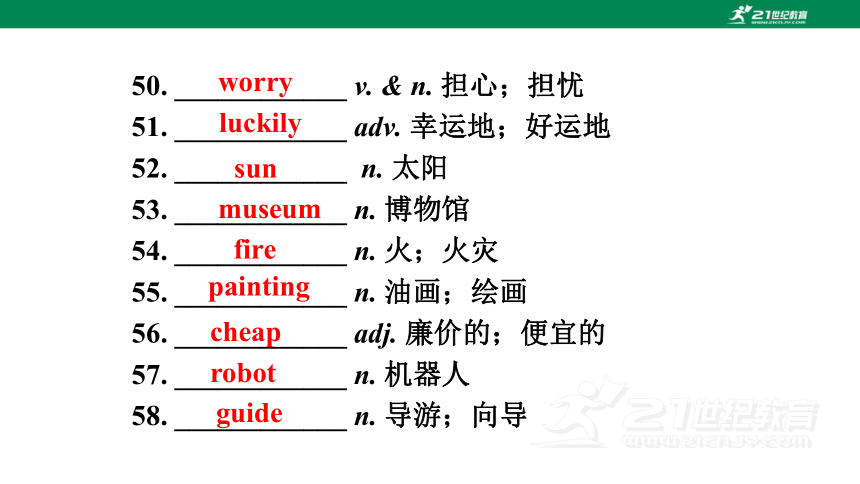
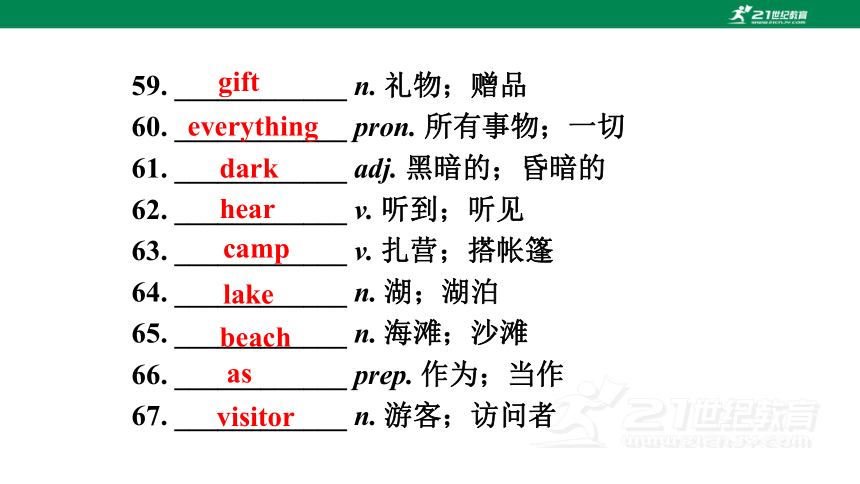
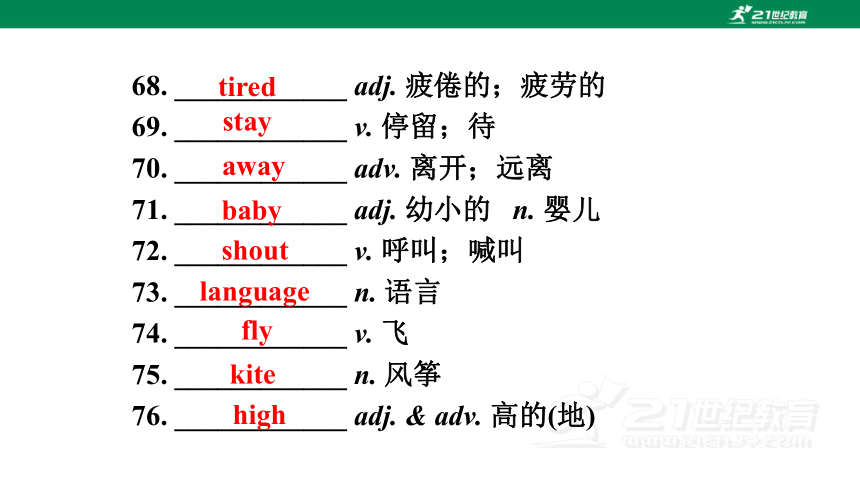
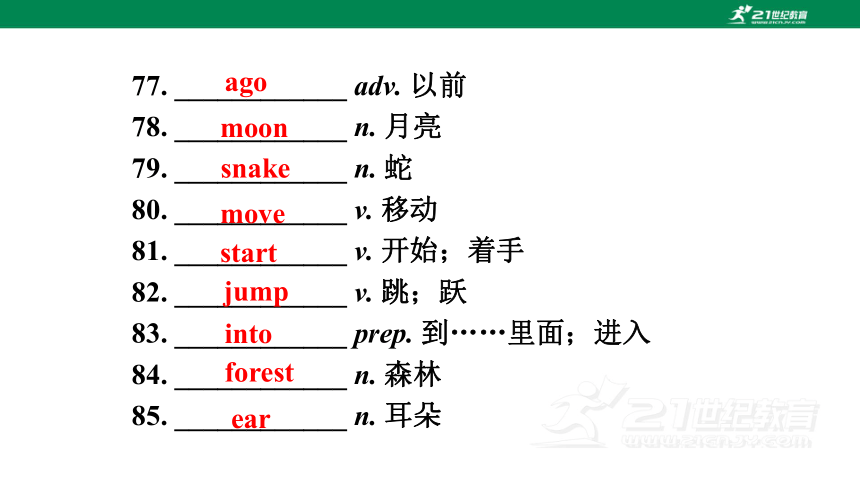
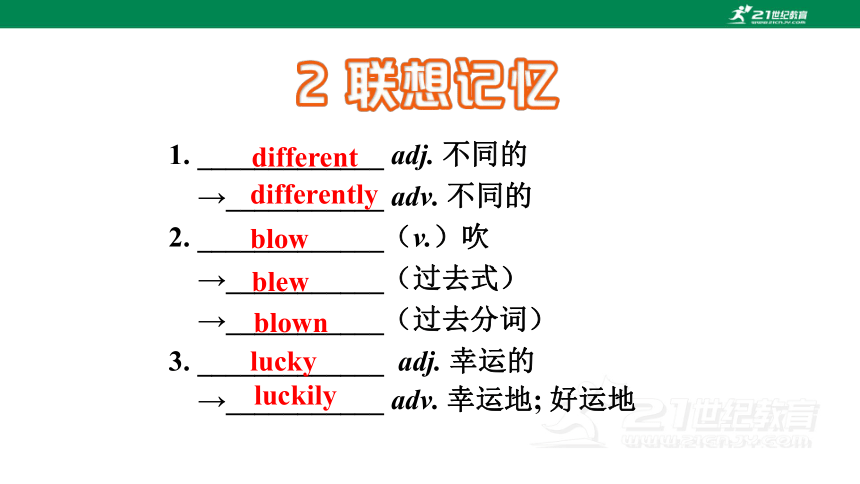
文档简介
(共120张PPT)
Units 10-12
人教版七年级下册
1. _____________ n. &v. 点菜;命令
2. _____________ n. 答案 v. 回答
3. _____________ conj. 如果
4. _____________ v. 将要;会
5. _____________ adj. 受欢迎的
6. _____________ v. 挤奶
7. _____________ adv. 相当;完全
8. _____________ v. 采;摘
order
answer
if
will
popular
milk
quite
pick
9. _____________ v. 听到;听见
10. ____________ v. 扎营;搭帐篷
11. ____________ prep. 作为;当作
12. ____________ v. 停留;待
13. ____________ adv. 离开;远离
14. ____________ v. 呼叫;喊叫
15. ____________ adj. 惊慌的;吓坏了的
16. ____________ v. & n. 担心;担忧
hear
camp
as
stay
away
shout
scared
worry
17. _____________ n. (常用复数形式)面条
18. ____________ n. 牛肉
19. ____________ n. 特色菜;特价品 adj.特别的;特殊的
20. ____________ modal v. 愿意
21. ____________ adv. (常用于否定句或疑问句) 还;仍然
22. ____________ adj. 大号的;大的
23. ____________ n. 大小;尺码
24. ____________ n. 碗
noodle
beef
special
would
yet
large
size
bowl
25. ____________ n. (可食用的)肉
26. ____________ n. 饺子
27. ____________ n. 鱼;鱼肉
28. ____________ n. 烙饼;薄饼
29. ____________ n. 世界
30. ____________ n. 答案 v. 回答
31. ____________ n. 蛋糕
32. ____________ n. 蜡烛
meat
dumpling
fish
pancake
world
answer
cake
candle
33. ____________ n. 年龄
34. ____________ conj. 如果
35. ____________ n. 糖果
36. ____________ adj. 受欢迎的;普遍的
37. ____________ n. 想法;主意
38. ____________ vt. 挤奶
39. ____________ n. 奶牛
40. ____________ n. 马
41. ____________ n. 农民;农场主
age
if
candy
popular
idea
milk
cow
horse
farmer
42. ____________ adv. 相当;完全
43. ____________ pron. (常用于否定句或疑问句)任何东西;任何事物
44. ____________ n. 农场 v. 务农;种田
45. ____________ v. 采;摘
46. ____________ adj. 极好的
47. ____________ n. 乡村;农村
48. ____________ adv. 昨天
49. ____________ n. 花
quite
anything
farm
pick
excellent
countryside
yesterday
flower
50. ____________ v. & n. 担心;担忧
51. ____________ adv. 幸运地;好运地
52. ____________ n. 太阳
53. ____________ n. 博物馆
54. ____________ n. 火;火灾
55. ____________ n. 油画;绘画
56. ____________ adj. 廉价的;便宜的
57. ____________ n. 机器人
58. ____________ n. 导游;向导
worry
luckily
sun
museum
fire
painting
cheap
robot
guide
59. ____________ n. 礼物;赠品
60. ____________ pron. 所有事物;一切
61. ____________ adj. 黑暗的;昏暗的
62. ____________ v. 听到;听见
63. ____________ v. 扎营;搭帐篷
64. ____________ n. 湖;湖泊
65. ____________ n. 海滩;沙滩
66. ____________ prep. 作为;当作
67. ____________ n. 游客;访问者
gift
everything
dark
hear
camp
lake
beach
as
visitor
68. ____________ adj. 疲倦的;疲劳的
69. ____________ v. 停留;待
70. ____________ adv. 离开;远离
71. ____________ adj. 幼小的 n. 婴儿
72. ____________ v. 呼叫;喊叫
73. ____________ n. 语言
74. ____________ v. 飞
75. ____________ n. 风筝
76. ____________ adj. & adv. 高的(地)
tired
stay
away
baby
shout
language
fly
kite
high
77. ____________ adv. 以前
78. ____________ n. 月亮
79. ____________ n. 蛇
80. ____________ v. 移动
81. ____________ v. 开始;着手
82. ____________ v. 跳;跃
83. ____________ prep. 到……里面;进入
84. ____________ n. 森林
85. ____________ n. 耳朵
ago
moon
snake
move
start
jump
into
forest
ear
1. _____________ adj. 不同的
→___________ adv. 不同的
2. _____________(v.)吹
→___________(过去式)
→___________(过去分词)
3. _____________ adj. 幸运的
→___________ adv. 幸运地; 好运地
different
blow
differently
blew
blown
lucky
luckily
4. _____________ v. 喂养;饲养
→___________(过去式/过去分词)
5. _____________ v. 种植;生长;发育
→___________(过去式)
→___________(过去分词)
6. _____________ adj. 感兴趣的
→ ___________ adj. 有趣的
7. _____________ adj. 使人兴奋的;令人激动的
→ ___________ adj. 兴奋的;激动的
feed
grow
grew
fed
interested
grown
interesting
exciting
excited
8. _____________ adj. 可爱的
→ ___________ n. & v. 爱;热爱
9. _____________ adj. 昂贵的
→ ___________ adj. 廉价的;便宜的
10. _____________ adj. 缓慢的;迟缓的
→ __________ adj. & adv. 快的(地)
11. _____________ v. 弄醒;醒
→ ___________ adj. 醒着的
v. (使)醒来;唤醒
fast
slow
lovely
expensive
cheap
love
wake
awake
12. _____________ n. 老鼠
→___________(复数)
13. _____________ n. 绵羊
→___________(复数)
14. _____________ n. 土豆
→___________(复数)
15. _____________ n. 自然
→___________(形容词)
16. _____________ v. 使惊奇
→___________ adj. 惊奇的
mice
sheep
potatoes
natural
surprised
mouse
sheep
potato
nature
surprise
1. ___________________ 愿意;喜欢
2. ___________________ 点菜
3. ____________________ 一(大)碗
4. ____________________ 世界各地
5. ____________________ 许愿
6. ____________________ 吹灭
7. ____________________ 受欢迎;流行
8. ____________________ 切碎
9. ____________________ 给……带来好运
would like
take one’s order
one (large) bowl of…
around the world
make a wish
blow out
get popular
cut up
bring good luck to…
10. ____________________ 给奶牛挤奶
11. ____________________ 骑马
12. ____________________ 喂鸡
13. ____________________ 许多
14. ____________________ 在乡下;在农村
15. ____________________ 消防站
16. ____________________ 总的来说
17. ____________________ 对……感兴趣
18. ____________________ 熬夜
milk a cow
ride a horse
feed chickens
quite a lot
in the countryside
fire station
all in all
be interested in…
stay up late
19. _________________ 跑开
20. _________________ 冲……大声叫嚷
21. _________________ 放风筝
22. _________________ 搭起;举起
23. _________________ 吃惊
24. _________________ 对……大声喊叫
25. _________________ 上上下下;起伏
26. _________________ 把……弄醒
27. _________________ 短缺……
run away
shout at…
fly a kite
put up
get a surprise
shout to…
up and down
wake…up
be short of…
28. ___________________ 沿路;一路上
29. ___________________长寿的象征
30. ____________________________鸡肉/ 牛肉/ 羊肉面
31. ___________________ 在湖边扎营
32. ___________________ 爬山
33. ___________________ 出来
34. ___________________ 在火上做饭
35. ___________________ 互相;彼此
36. ___________________ 中学毕业
along the way
a symbol of long life
chicken / beef / mutton noodles
camp by the lake
climb the mountains
come out
cook food on the fire
each other
finish high school
37. ___________________ 礼品店
38. ________________________________
去划船 / 野营 / 钓鱼
39. ___________________ 去散步
40. ___________________ 参加学校旅行
41. ___________________ 早早地去睡觉
42. ___________________ 种苹果
43. ___________________ 关于……了解很多
gift shop
go boating / camping / fishing
go for a walk
go on a school trip
go to sleep early
grow apples
learn a lot about…
44. __________________ 生活习惯
45. __________________ 向……外看
46. __________________ 丢东西
47. __________________ 生火
48. __________________ 根本不;完全不
49. __________________ 在头一天的夜里
50. __________________ 摘草莓
51. __________________________领某人参观某地
52. __________________ 备考
living habits
look out of…
lose things
make a fire
not…at all
on the first night
pick strawberries
show sb. around some place
study for a test
53. _____________________ 拍些照片
54. _____________________ 带某人去某地
55. _____________________ 看星星
take some photos
take sb. to some place
watch the stars
1. —你想吃哪种面条?
—我想要……
—____________________ would you like
—I’d like ...
2. —What size bowl would you like
—A large / medium / small bowl.
—您想要多大碗的?
—大 / 中 / 小碗。
What kind of noodles
3. 蜡烛的数量就是这个人的年龄。
__________________________ the person’s age.
The number of the candles is
4. 如果他(她)一口气把蜡烛全部吹灭的话,许的愿望便会成真。
If he or she blows out all the candles, __________, the wish _______________.
5. Would you like ... 您想要……吗?
in one go
will come true
6. 然后导游教我们如何制作机器人模型。
Then the guide taught us ___________________________.
how to make a model robot
7. 作为一份特殊的礼物,我们的父母带我们去了印度。
As a special gift, our parents __________ India.
took us to
8. 学习第二语言很重要。
____________________ a second language.
9. 你上周的旅行怎么样?
___________ your trip last week
10. What did ... do last weekend ……上周末干什么了?
11. Where did ... go last weekend ……上周末去哪儿了?
It’s important to learn
How was
1. order
order
n.& v. 点菜
熟义
生义
n.& v. 命令
n. 顺序;秩序、治安
v. 预定
v. 订货;订购
v. 组织
【语境应用】说出下列划线单词的词性和意思。
1) He ordered the soldiers to leave at once.
_______________
2) The police kept order. ______________
3) He ordered a large bowl of noodles. _____________
4) You will pass a school, a church, and a bus station, in that order. ____________
5) The orders are that we stay here. ___________
v. 命令
n. 秩序
v. 点(餐)
n. 顺序
n. 命令
fish
指鱼的条数时(可数名词),
单复数同形;指鱼的种类时,
复数形式为fishes。
2. fish n. 鱼;鱼肉
v. 钓鱼
n.
v.
鱼肉 (不可数名词)
钓鱼 go fishing 去钓鱼
【语境应用】说出下列句子中fish的词性和汉语意思。
1) There are many fish in this river.
________ ________
2) I want to fish tomorrow.
________ ________
3) I like eating fish. ________ ________
n. 鱼
v. 钓鱼
n. 鱼肉
3. answer n. 答案
v. 回答
answer v.
answer the question 回答问题
answer a letter 复信
answer the telephone 接电话
answer the door 应门
【语境应用】写出黑体词的词性及划线部分的汉语意思。
1) Dave didn't give an answer to her email.
________ ____________
2) Wendy doesn't want to answer my questions.
________ ____________
3) Nobody answered the door.
________ ____________
名词 回复她的邮件
动词 回答我的问题
动词 应门铃声开门
4. will
will
v. 将要;会
熟义
生义
n. 意志;决心
n. 遗嘱
【语境应用】将下列英语句子翻译成汉语。
1) There will be a class meeting tomorrow afternoon.
_____________________________________________________
2) Will you open the window
_____________________________________________________
3) Children will be children.
____________________________________________________
明天下午有一个班会。
你打开窗户,好吗?
孩子总归是孩子。
4) You can win if you have the will to try hard.
___________________________________________________
5) In the old man’s will, he wanted to leave all his money to the charity.
___________________________________________________
如果你有决心努力尝试,你会赢的。
在那个老人的遗嘱中,他想把所有的钱捐给慈善机构。
5. feed v. 喂养;饲养
feed
feed sb. sth. / feed sb. with sth.
用……喂养……
vt.
vi.
feed on... 以……为食
feed sth. to sb.把……喂给……
【语境应用】根据句意从方框中选出恰当的单词填空,有的需要变换形式。
1) Pandas ________ ________ bamboo.
2) Please ________ my dog a piece of bread.
3) Farmers ________ wheat ________ chickens.
4) The mother always ________ her child ________ milk.
feed, feed on, feed ... with ..., feed ... to ...
feed on
feed
feed to
feed with
6. grow v. 种植;生长;发育
grow
种植 后面直接跟宾语
vt.
vi.
生长;发育 后面不跟宾语
grow up 长大
【语境应用】请将下列句子翻译为英语。
1) 这个男孩长得很快。
__________________________________________________
2) 李菲的父亲在他的家乡种植水稻(rice)。
__________________________________________________
The boy grows very fast.
Li Fei’s father grows rice in his hometown.
7. pick v. 采;摘 (其后可以跟表示花、水果等名词作宾语)
【拓展】
pick up 拿起;举起;用车接某人
如果宾语为名词,可放在up之前或之后;如果宾语为代词,只能放在pick与up之间。
(2020甘肃天水中考)
—Shall we go to the airport to ______ your sister
—No. She will come here by taxi.
A. give up B. pick up
C. look after D. come across
B
【语境应用】将下列汉语句子翻译成英语。
1) 他正在摘胡萝卜。
2) 桌子下面有把尺子。请把它捡起来。
He is picking the carrots.
There is a ruler under the desk. Please pick it up.
8. worry v. & n. 担心;担忧
worry
烦恼;担心 worry about
vi.
n.
烦恼;忧虑(不可数名词)
令人担忧的事(可数名词)
worried adj. 烦恼的;焦虑的
be worried about = worry about
【语境应用】英汉互译。
1) 我没有什么可担心的。
2) He brought his parents a lot of worry when he was young.
3) 尽量忘掉你的那些烦心事吧。
I have nothing to worry about.
他小的时候给他父母带来很多烦恼。
Try to forget your worries.
9. exciting & exctied
excited adj. 感到激动的 作表语时,主语通常是人;作定语时,常用来修饰人。
exciting adj. 令人激动的 作表语时,主语通常是物;作定语时,常用来修饰物。
【语境应用】根据句意选用excited或exciting填空。
1) They waited and waited for something ________ to happen.
2) The children were ________ about winning the football match.
exciting
excited
(2022黑龙江齐齐哈尔)
3) —Have you heard Shenzhou XIV manned spacecraft (载人
飞船) was sent up successfully
—Wow, that sounds ________. How great our country is!
A. interesting B. exciting C. relaxing
B
【链接】
interesting 有趣的
interested 感兴趣的
surprising 令人惊奇的,使人吃惊的
surprised 吃惊的,惊奇的
frightening 令人害怕的
frightened 害怕的
10. fast adv. & adj. 快地(的);反义词slow
fast, quick与soon
fast adv. / adj. 侧重于指人或物体具有动作快的特点。
quick adj. /adv. 表示某事在较短的时间内发生或完成,表示动作短促、迅速。也指(脑子)反应快,“聪明的,敏锐的” 。
soon adv. 不久 侧重指两件事的先后发生,中间间隔时间很短。
【语境应用】请根据句意选用quick, fast或soon完成下列句子。
1) I want to see him ________.
2) Lin Hai runs very _______.
3) His father is a _______ worker.
4) I think she can come back ______.
5) Mary often gives _______ answers to the teacher’s questions.
fast
soon
quick
soon
quick
11. guide
guide
n. 导游;向导
熟义
生义
n. 指南;手册
v. 给某人领路(或导游);指引
【语境应用】完成句子。
1) Mike __________ (引导,引路)the lost tourists across town.
2) You need a __________ (向导,导游)to show you around
the city.
guide
guided
12. hear v. 听到;听见
hear
hear sb. doing sth. 听见某人正在做某事
强调听到的动作正在进行
hear sb. do sth. 听见某人做某事
强调听到的是动作自始至终的整个过程
hear / listen to/ sound
hear vt. 听见,听到 强调“听”的结果
hear of 听说
hear from sb. 收到某人来信
listen vi. (注意地)听 表示“听”的动作,若后接宾语,要用listen to。
sound 感官动词, “听起来” ①后常接形容词作表语,如:
sound interesting
② sound like 听起来像
【语境应用】
【注意】
类似用法的还有see, notice, watch等感官动词。它们后接省略to的不定式,但变为被动语态时,要还原to。
1) (2021湖北武汉) The official newspaper _______ the news of Tiangong-1, for it took a big step forward into space.
A. heard B. checked C. believed D. celebrated
D
3) When I reached the finish line, I ________ my whole class cheering for me with excitement.
A. listened B. sounded C. listened to D. heard
4) All the students were ________ the famous scientist’s speech carefully in the school hall.
A. sounding B. hearing C. listening to D. listening
D
C
2) (2020贵州黔东南中考) Ms. Ling got a letter from her pen friend yesterday.
A. wrote to B. heard from C. waited for D. heard of
B
5) —Tom’s voice ________ weak. He is ill in hospital now.
—Let’s go to visit him.
A. sounds B. listens C. hears D. listens to
6) I don’t know the actor of the movie, but I have _________ him. He is quite popular among the young people.
A. heard from B. heard of
C. listened to D. sounded like
A
B
13. stay v. 停留;待
stay
stay (at) home 待在家
stay up late 熬夜
stay away from 远离
linking verb 继续是;保持;维持
后面常接形容词作表语,作此用法
时与keep意思相近。
【语境应用】(2022新疆中考)
1) We promised to meet at 10 in the park last Sunday, but Bob didn't______ until 12.
A. put up B. show up C. stay up D. give up
(2022海南中考)
2) —It's said that the Shenzhou-14 astronauts will say hello to us on Mid-Autumn Day.
—Wonderful! I'm ______it.
A. getting along with B. staying away from C. looking forward to
C
B
14. away adv. 离开;远离
动词与away连用都有“由近及远”的意思
【链接】
away
take away拿走
cut away切除
keep away from 远离
go away离开
run away逃跑
get away走开
fly away飞走
put away把……放好
【语境应用】根据汉语意思完成英语句子,每空一词。
1) 罗斯住的村庄离城镇有10公里远。
The village where Rose lives is ten kilometers ______ ______ town.
2) 我不再需要这些旧玩具了,你可以把它们拿走。
I don’t need these old toys anymore. You can ______ ______ ______.
3) 中学生必须远离网吧。
Middle school students must ______ ______ ______ the net bar.
keep away from
away from
take them
away
15. shout v. 呼叫;喊叫
shout
后面可以接名词(短语)或that从句。
vt.
vi.
shout to sb. 多指距离远,为了让对方
听到而不得不大声叫喊,不含生气、
愤怒等感情因素。
shout at
多指因为生气、愤怒等而非善意地对
某人吼叫。
【语境应用】选词语填空。
1) The teacher had to ______________ the students because they couldn't hear him.
2) Mary’ s dad ______________ her just now, but now he feels sorry about it.
shout at, shout to
shout to
shouted at
16. surprise n. 惊奇;惊讶
v. 使吃惊
surprise
主语是人和物
v.
n.
to one’s surprise
令某人感到惊奇的是
get a surprise 吃惊
in surprise 惊讶地
【链接】
同根词
surprising adj. 令人吃惊的
一般用来修饰事物
surprised adj.
感到惊讶的
常用人作主语。
be surprised at
对……感到惊讶
be surprised to do sth.
对做某事感到惊讶
be surprised+that从句
【语境应用】选用surprise, surprised或surprising填空。
1) The bad news didn’t _________ him.
2) To my ________, they gave me the work.
3) We were __________ to know that she was English.
4) We were _________ at the _________ news.
surprise
surprise
surprised
surprised
surprising
5) (2021贵州黔东南中考)
—I always fell ______ when speaking in front of others.
—Take it easy and be brave.
A. surprised B. nervous C. interested D. different
B
17. move v. 移动
move
移动;搬动
vt.
vi.
后接地点副词,不用加介词。
搬家;迁移
move to+表示地点的名词(短语)
迁移到某地
【语境应用】翻译句子。
1) 我想搬到上海。
2) 那个镇子不太好。不要搬到那儿去。
I would like to move to Shanghai.
That town is not so good. Don’t move there.
3) He moved the dresser to the corner of the room.
他把梳妆台搬到了房间的角落。
18. wake v. 弄醒;醒
wake与awake
wake和awake都可用作及物动词,后面都可直接跟宾语。不同的是wake指把某人从睡梦中叫醒;而awake指把某人唤醒,多偏向于精神方面的醒悟。
awake还可用作形容词,意为“醒着的”,一般只在句中作表语;be awake to意为“对某事有醒悟/觉悟”。
wake和awake都可用作不及物动词。wake常与副词up连用,而awake不可。名词作wake up的宾语时,可放在wake和up中间,也可放在up之后;但宾语是代词时,必须放在wake和up的中间。
【语境应用】请根据句意用wake或awake填空。
1) The baby kept _______ till 11:30 last night.
2) His grandparents always _______ up at 4:00 every morning.
3) No sound can ____________ my son when he was young.
4) I wonder whether you can _______ Ann’s interest in art.
awake
wake
wake / awake
awake
1. cut up 切碎
【链接】
cut off 切除;切断;中断
cut down 砍倒
cut ... into ... 把……切成……
cut短语
cut off, cut up, cut down
【语境应用】选词填空。
1) You mustn’t __________ the trees here.
2) My mother will __________ some meat to make dumplings for us.
3) He was so careless that he __________ his finger at work.
cut off
cut down
cut up
2. quite a lot (of…) 许多
既可修饰动词,也可修饰名词。当修饰名词时a lot后面需加of。
quite和very都表示程度,其区别在于:quite在修饰名词时位于不定冠词之前,即“quite + a / an +形容词+可数名词单数”。very则位于不定冠词之后,即“a very +形容词+可数名词单数”。
【链接】
【语境应用】根据汉语意思完成英语句子,每空一词。
1) 我相当喜欢那部电影。
I like that movie ______ ______ ______.
2) 那家商店里有相当多的人。
There are ______ ______ ______ ______ people in that store.
3) 她是一个很可爱的女孩。
She’s ______ ______ ______ girl. / She’s ______ ______ ______ girl.
quite a lot
quite a lot of
quite a lovely a very
lovely
3. put up 建造;搭建;举起;张贴
【链接】
put back 把……放回原处
put down 放下;写下
put off 推迟;拖延
put through 接通电话
put on 增加(体重);穿上;表演
put out 熄灭
put away 收起来
put in 安装
put短语
【语境应用】翻译句子。
1)去年他们盖了许多高楼。
2) 若要提问请举手。
3) 我们最好在这儿贴一张通知。
They put up many tall buildings last year.
Put up your hand if you want to ask a question.
We’d better put up a notice here.
单项选择。
4) We have to ________ the sports meeting because of the bad weather.
A. turn off B. put off C. take off D. get off
(2022广西贺州中考)
5) —Maria, don't forget to _______ the sports shoes. You have a P. E. class today.
—Thanks, mom. I won't.
A. get up B. put on C. take off D. cut down
(2022湖北黄冈、孝感、咸宁中考)
B
B
6) The government is ________ elevators(电梯)in the old buildings of some communities so that people, especially the elderly can go up and down easily.
A. putting away B. putting out
C. putting in D. putting through
(2022江苏泰州中考)
C
7) Many Chinese people usually some paper cuttings on windows, doors and walls as symbols of wishes for good luck.
A. put up B. put off C. cut up D. cut off
(2022四川遂宁中考)
A
Would you like sth. 询问对方是否想要某物。
肯定答语:“Yes, please. / OK. / All right.”等,
否定答语:“No, thanks.”等。
would like sb. to do sth.想要某人做某事
Would you like to do sth.
询问对方是否愿意做某事。
肯定答语:“Yes, I’d like / love to.”。
否定答语:“I’d like / love to, but ...”。
What would sb. like (to do)
用来询问对方或别人想要(做)什么。
4. would like 愿意;想要
【语境应用】
Ⅰ. 汉译英
你想要一碗牛肉面吗?
2) 汤姆(Tom)不愿意和我下国际象棋。
3) 妈妈想让我早点回家。
Would you like a bowl of beef noodles
Tom would not like to play chess with me.
My mother would like me to go home early.
Ⅱ. 完成下列各题。
1) The girl would like some apple juice. (对划线部分提问)
2) I would like to go to the party this evening.
(改为一般疑问句并作肯定回答)
What would the girl like
—Would you like to go to the party this evening
—Yes, I’d like / love to.
III. 单项选择。
—Would you like to have a picnic with us
—_______. Thanks.
A. Yes, I'd love to B. It doesn't matter
C. I'm sorry to hear that D. I don't think so
(2022湖北黄冈、孝感、咸宁中考)
A
the number of “……的数量”,其后接可数名词复数;作主语时,谓语动词用单数。
a number of “许多;大量”,相当于many,用来修饰可数名词复数;作主语时,谓语动词用复数。
5. the number of & a number of
【语境应用】按要求完成各题。
1) The number of some wild animals ________ less and less, so we must take action to protect them right away.
A. am getting B. get
C. gets D. are getting
2) There ________ (be) a number of students attending the sports meeting. The number of them ________ (be) four hundred.
C
are
is
1. Then the guide taught us how to make a model robot.
“疑问词+不定式”可以在句中作主语、宾语、表语。
e.g. When to start has not been decided yet.
Please tell us which road to take.
His problem is how to remember the new words.
【语境应用】请用“疑问词+动词不定式”结构完成下列句子,并说出其在句中所作的成分。
1) I wonder (该买哪枝笔).(作 语)
2) (到哪里去找) Tina is puzzled.(作 语)
3) He didn’t know (是否该去) to the party.(作 语)
4) My trouble is (怎样告诉) my parents about it(作 语)
which pen to buy
宾
Where to find
主
whether to go
宾
how to tell
表
【语境应用】完成下面的同义句转换,每空一词。
Guo Yang is so tired that he can’t walk any further.
Guo Yang is ________ ________ ________ ________ any further.
too tired to walk
2. But I was so tired that I went to sleep early.
so+形容词/ 副词+that…“如此……以至于……”
“so…that”可以和“too…to…”结构进行句型转换。
would like结构
【考点1】
would like意为“愿意;想要”,与want同义,但两者语气差别较大,前者礼貌委婉、正式规范,后者直接、非正式且随意。
【考点2】
would like后可接名词(短语)、代词或动词不定式作宾语,也可构成would like sb. to do sth.结构,意为“想要某人做某事”。would没有人称和数的变化,如果主语为人称代词,它可以缩写为'd,如I would = I'd。
【考点3】
句型“Would +主语+ like sth. ”用来询问某人是否想要某物。其肯定答语通常为Yes, please / OK / All right等,否定答语通常为No, thanks等。
(注意:在该句型中,可用some表示问话人希望得到对方肯定的回答。)
◆句型“Would +主语+ like to do sth. ”用来询问某人是否愿意做某事。常见句型Would you like to do sth. 的肯定答语通常为Yes, I'd like / love to,否定答语通常为I'd like / love to, but ...,but后面的句子常用来说明拒绝的理由。
◆句型“What would +主语+ like (to do) sth. ”用来询问某人想要(做)什么。其答语通常为“主语(人称代词)+ would like (to do) sth.”。What后还可跟名词,如kind, size, fruit等,用来询问具体信息。
1. —Would you like to go to the history museum with me
—_______.
A. Sure, I’d love to B. Yes, I do C. That’s right
(2022湖南怀化)
2. —Would you like to go to the youth centre with me tomorrow
— ________ I can’t wait for the robot show there.
A. Yes, that's right. B. Sure, I'd love to.
C. Of course not. D. Not at all.
(2022 江苏宿迁中考)
A
B
3. —Would you like to visit the National Science Museum with me tomorrow, Amy
— __________.
A. See you then B. Sounds nice
C. Excuse me D. I hope not (2022湖北武汉)
4. — Would you like to go to the movies with me tonight
— ________ I have to prepare for my English test.
A. Yes, I would. B. I’m afraid not.
C. Never mind. D. I’d love to. (2022四川广元中考)
B
B
一般过去时
一、用法
一般过去时表示过去某个时间或某一段时间内发生的动作或存在的状态,常和表示过去的时间状语连用,如yesterday, the day before yesterday, ... ago, ... later, just now, at that moment, last ..., in 2001, in the past, last year等。如:
He was in the park yesterday afternoon.
I stayed at home from Monday to Friday last week.
Tom lived with his grandparents in the past.
一般过去时也表示过去经常或反复发生的动作,常与often, usually, always等表示频度副词连用。如:
When we were young, we often played ping-pong together.
Alice always walked to her office a few years ago.
二、结构:
be动词的一般过去时 行为动词的一般过去时
肯定 主语+be动词(was, were)+其他. 主语+行为动词的过去式+其他.
否定 主语+ be动词(was, were)+not+其他. 主语+didn’t+行为动词原形+其他.
be动词的 一般过去时 行为动词的
一般过去时
一般疑问 be动词(Was, Were)+主语+其他 Did+主语+行为动词原形+其他
特殊疑问 疑问词(不作主语)+be动词(was, were)+主语+其他 疑问词(不作主语) +did+主语+行为动词原形+其他
行为动词的过去式变化:
1. 一般在动词词尾直接加ed:
look → looked, listen → listened
2. 以“不发音的字母e”结尾的动词后加d:
live → lived, dance → danced,
like → liked
3. 以重读闭音节结尾的动词,如果末尾只有一个辅音字母,先双写这一辅音字母,再加ed:
stop → stopped, shop → shopped
4. 以“辅音字母+y”结尾的动词,将y变为i ,再加ed:
try → tried, study → studied
5. 以“元音字母+y”结尾的动词变过去式时,在词尾直接加ed:
stay → stayed, play → played
6. 有些动词的过去式形式需要特殊记忆,常见的有:
begin → began, bring → brought,
come → came, draw → drew,
drink →drank, drive → drove, eat → ate,
fall→ fell, get→ got, give→ gave,
go→went, grow → grew, have → had,
keep → kept, know→ knew, leave → left,
make→ made, read→read, run→ ran,
say→said, see → saw, sit → sat, tell →told等。
1. Daniel has gone to Beijing on business.
Oh, I didn't know. When ________?
A. has he left B. was he leaving
C. did he leave D. will he leave
(2022 江苏徐州中考)
2. Helen, why didn't you come to the party yesterday
Oh, I___________ for the speech competition.
A. prepares B. prepared C. will prepare
(2022吉林中考)
C
B
3. Li Lei ______ the school bus last Friday.
A. misses B. missed C. was missing D. has missed
(2022湖北江汉油田、潜江、天门、仙桃中考)
4. Mike is from America but speaks perfect Chinese.
So he does. He has learned Chinese by himself since he ________ college.
A. is attending B. has attended C. attended
(2022黑龙江牡丹江鸡西中考)
B
C
5. Have you ever visited Shenyang EXPO Garden
Yes. I ________ it last year.
(2021黑龙江牡丹江鸡西中考)
A. have visited B. will visit C. visited
C
6. Where does Bill live
He ______ me his address, but I can't remember it now.
A. tells B. told C. is telling D. will tell
(2021 广西贵港中考)
B
7. My parents and I ________ trees last Sunday.
A. plant B. will plant C. are planting D. planted
(2021 北京中考)
8. During Dr Mar’s last visit, he_________ on 150 patients on the ORBIS plane.
A. operates B. is operating C. will operate D. operated
(2021江苏盐城中考)
D
D
9. What did you do this Dragon Boat Festival
I _________ the boat races on TV and read books.
A. watch B. watched C. am watching D. will watch
(2021云南昆明中考)
10. Have you watched the film Gulliver's Travels
Yes, I _________ it during the Spring Festival. What about you
A. watch B. watched C. will watch D. have watched
(2021江苏扬州中考)
B
B
11. Last Sunday my brother and I _______ our grandparents.
A. will visit B. visits C. visit D. visited
(2021重庆中考B卷)
12. My father ________ me a funny joke and I can't stop laughing every time I think of it.
A. told B. tells C. will tell D. is telling
(2021浙江温州中考)
D
A
社会交往(Social communications)
就餐(Having meals)
→A: May I take / have your order
B: Yes. I’d like some noodles, please.
→A: What kind of noodles would you like
B: I’d like chicken noodles, please.
→A: What size would you like
B: A large / medium / small bowl, please.
→A: Would you like something to drink / eat
B: Yes, I’d like some green tea / dumplings.
→A: What would you like (to have)
B: I’d like a hamburger.
→A: Would you like some more fish
B: Yes, please. / No, thank you. I’ve had enough. / Just a little, please.
【写作任务】
假如你是李华,就读于一所国际寄宿制学校。请你根据所给要点用英语写一篇日记记录以下活动。
学校
——观看《开学第一课》
时间 九月一日晚上八点
地点 学校大厅
参加人 全校师生
活动 观看电视节目《开学第一课》(First Class for New Semester)
主题 理想照亮未来 (To shine the future with ideals)
主要内容 邀请名人讲述故事
你的感想 ……
要求:1. 语言表达要准确,语意要通顺、连贯;2. 词数不少于100。
审题与构思
1. 本写作任务要求写一篇日记,属于应用文。日记主体内容应围绕自己观看《开学第一课》的经历展开。
2. 日记多采用第一人称。
3. 由于观看电视节目的活动发生在过去,故使用一般过去时。
谋篇布局
常用表达
简介观看时间、地点
organized ... to watch ..., watched ... together, in the school hall, at ... o'clock, ...
节目内容
The theme of the program / show is ...
It tells us the stories about ...
The program / show tells us how ...
It encourages / educates us to ...
简述自己的感想
I learned a lot from ...
It made me feel proud of ...
I was encouraged ...
It helps me make up my mind ...
I think it is the most important ...
补全短文
Wednesday, September 1st
Today, (1)_____________________________________________
_________________________(我们学校的全体师生观看了电视节目) First Class for New Semester in the school hall at 8:00 p.m.
This year's theme is “To shine the future with ideals”. Its directing team (2)_______________________________________
(邀请了许多名人) such as Zhang Guimei, the famous teacher, and Tang Hongbo, Nie Haisheng and Liu Boming, the three taikonauts from our space station, to tell their stories.
all the teachers and students in our school watched the TV program / show
invited many / lots of / a lot of famous people
They encouraged us (3)__________________________________ (勇敢面对任何困难). Also, they (4)________________________
__________________________(教育我们要有梦想并且努力去实现它们).
I think First Class for New Semester is the most important lesson. It encourages us teenagers to work hard (5)______________________(创造一个更好的未来).
to be brave when facing any difficulty
educated us to have dreams and work hard to realize them
to create a better future
I.词汇运用。
A) 根据语境及所给首字母提示,补全所缺单词。
1. Su Yiming got a gold medal (金牌) at the a of 17.
2. Jim eats too much ice-cream and his mom always w about his health.
3. Our a to the same question may be different.
4. If you want to learn a lot about the museum, you can ask a g to show you around.
5. Let's not go out today. The wind is b hard
age
worries
answers
guide
blowing
B) 根据语境,从方框中选择恰当的单词填空,注意形式变化。每词限用一次。
feed, camp, special, mouse, move
6. Simon and his friends _______ near the beach last weekend.
7. _______ usually run fast and it's difficult to catch (抓住) them.
8. My parents took me to the zoo and I _______ the giraffes.
9. Don't _______ the cup on the desk. It's very hot.
10. The Lantern Festival (元宵节) is a _______ festival for Chinese people.
camped
Mice
fed
move
special
Ⅱ. 完成句子。
A) 根据汉语意思,完成英语句子。
1. 该休息了。你不可能一口气把工作干完。
It's time to relax. You can't finish the work _______________.
2. Peter在乡下度过了一个月。
Peter spent a month _____________________.
3. 这些来自英国的孩子对中国古典诗词感兴趣。
These children from the UK _____________________ Chinese classical poetry.
in / at one go
in the countryside
are interested in
4. 外面很吵,把婴儿弄醒了。
It was noisy outside and it ____________________________
_________.
5. 珠穆朗玛峰太高以至于它上面的雪终年不化。
Qomolangma ___________________ the snow on it does not melt all year round.
woke the baby up / woke up the
baby
is so high that
B) 根据括号内的要求完成下列各题。
6. Dave sleeps for eight hours every night. (用last night替换every night改写句子)
Dave _____________________ last night.
7. Tina read an interesting storybook just now. (改为一般疑问句)
_____________________ an interesting storybook just now
8. Emma would like a medium bowl of noodles. (对划线部分提问)
________________________ would Emma like
slept for eight hours
Did Tina read
What size bowl of noodles
9. Mike went boating with his cousin last Sunday. (对划线部分提问)
__________________________ last Sunday
10. Lucy got to school by subway this morning. (对划线部分提问)
_____________________ to school this morning
Who did Mike go boating with
How did Lucy get
Ⅲ. 根据对话内容,从方框中选择恰当的选项补全对话,其中有两项多余。
A: Excuse me. Is this table free
B: Yes, sir.
A: Well, I'll take it.
B: OK, sir. (1)_______ Please have a look.
A: Thanks. I think I'll start with some orange juice. Then I'll see what to eat.
B: OK.
(Two minutes later)
B: Here is the juice, sir. (2)_______
A. No problem.
B. Here is the menu (菜单).
C. I'd like some chicken.
D. Would you like some fish
E. May I take your order now
F. And what size would you like
G. And what dessert (饭后甜点) would you like
B
E
A: Well, yes. First I'll have a vegetable salad and a hamburger. Hmm ... could you recommend (推荐) something
B: Sure. (3)_______ It's our special today.
A: That sounds good. I'll try it.
B: (4)_______
A: I'd like some ice-cream.
B: (5)_______ Is that all, sir
A: Yes, that's all for now.
A. No problem.
B. Here is the menu (菜单).
C. I'd like some chicken.
D. Would you like some fish
E. May I take your order now
F. And what size would you like
G. And what dessert (饭后甜点) would you like
D
G
A
Ⅳ.根据短文内容,从方框中选择恰当的单词填空,注意形式变化。每词限用一次。
if, exciting, live, start, dark, shout, away, beach, around, stay
Katy and Fred went to visit their cousin, David. He (1)_______ on an island (岛 ) and they wanted to go to the beach to see the turtles (海龟).
On the second day, David's dad took the children to the (2)_______ to look for turtles. The children were very happy. They (3)_______ there for a long time, but no turtle came.
lived
beach
stayed
Then it got (4)_______ so they had to go home. They did this three days in a row (连续) but they didn't see any turtles.
On the fifth day, they came again. They sat on the beach in the sun. “(5)_______ we don't see any turtles, I'll still be happy,” Katy said. “Because it's relaxing here.”
Then Katy (6)_______ to sing. Fred and David played volleyball on the beach. After some minutes, David's dad (7)_______, “Look! The turtles!”
if, exciting, live, start, dark, shout, away, beach, around, stay
dark
If
started
shouted
The children saw two turtles climbing up to the beach.
“Wow!” Fred said. “It's (8)_______!”
The turtles came very near to them, and they sat (9)_______ the turtles.
Later, the turtles went back to the water and swam (10)_______. Then the children waved (挥手) goodbye to them.
if, exciting, live, start, dark, shout, away, beach, around, stay
exciting
around
away
Units 10-12
人教版七年级下册
1. _____________ n. &v. 点菜;命令
2. _____________ n. 答案 v. 回答
3. _____________ conj. 如果
4. _____________ v. 将要;会
5. _____________ adj. 受欢迎的
6. _____________ v. 挤奶
7. _____________ adv. 相当;完全
8. _____________ v. 采;摘
order
answer
if
will
popular
milk
quite
pick
9. _____________ v. 听到;听见
10. ____________ v. 扎营;搭帐篷
11. ____________ prep. 作为;当作
12. ____________ v. 停留;待
13. ____________ adv. 离开;远离
14. ____________ v. 呼叫;喊叫
15. ____________ adj. 惊慌的;吓坏了的
16. ____________ v. & n. 担心;担忧
hear
camp
as
stay
away
shout
scared
worry
17. _____________ n. (常用复数形式)面条
18. ____________ n. 牛肉
19. ____________ n. 特色菜;特价品 adj.特别的;特殊的
20. ____________ modal v. 愿意
21. ____________ adv. (常用于否定句或疑问句) 还;仍然
22. ____________ adj. 大号的;大的
23. ____________ n. 大小;尺码
24. ____________ n. 碗
noodle
beef
special
would
yet
large
size
bowl
25. ____________ n. (可食用的)肉
26. ____________ n. 饺子
27. ____________ n. 鱼;鱼肉
28. ____________ n. 烙饼;薄饼
29. ____________ n. 世界
30. ____________ n. 答案 v. 回答
31. ____________ n. 蛋糕
32. ____________ n. 蜡烛
meat
dumpling
fish
pancake
world
answer
cake
candle
33. ____________ n. 年龄
34. ____________ conj. 如果
35. ____________ n. 糖果
36. ____________ adj. 受欢迎的;普遍的
37. ____________ n. 想法;主意
38. ____________ vt. 挤奶
39. ____________ n. 奶牛
40. ____________ n. 马
41. ____________ n. 农民;农场主
age
if
candy
popular
idea
milk
cow
horse
farmer
42. ____________ adv. 相当;完全
43. ____________ pron. (常用于否定句或疑问句)任何东西;任何事物
44. ____________ n. 农场 v. 务农;种田
45. ____________ v. 采;摘
46. ____________ adj. 极好的
47. ____________ n. 乡村;农村
48. ____________ adv. 昨天
49. ____________ n. 花
quite
anything
farm
pick
excellent
countryside
yesterday
flower
50. ____________ v. & n. 担心;担忧
51. ____________ adv. 幸运地;好运地
52. ____________ n. 太阳
53. ____________ n. 博物馆
54. ____________ n. 火;火灾
55. ____________ n. 油画;绘画
56. ____________ adj. 廉价的;便宜的
57. ____________ n. 机器人
58. ____________ n. 导游;向导
worry
luckily
sun
museum
fire
painting
cheap
robot
guide
59. ____________ n. 礼物;赠品
60. ____________ pron. 所有事物;一切
61. ____________ adj. 黑暗的;昏暗的
62. ____________ v. 听到;听见
63. ____________ v. 扎营;搭帐篷
64. ____________ n. 湖;湖泊
65. ____________ n. 海滩;沙滩
66. ____________ prep. 作为;当作
67. ____________ n. 游客;访问者
gift
everything
dark
hear
camp
lake
beach
as
visitor
68. ____________ adj. 疲倦的;疲劳的
69. ____________ v. 停留;待
70. ____________ adv. 离开;远离
71. ____________ adj. 幼小的 n. 婴儿
72. ____________ v. 呼叫;喊叫
73. ____________ n. 语言
74. ____________ v. 飞
75. ____________ n. 风筝
76. ____________ adj. & adv. 高的(地)
tired
stay
away
baby
shout
language
fly
kite
high
77. ____________ adv. 以前
78. ____________ n. 月亮
79. ____________ n. 蛇
80. ____________ v. 移动
81. ____________ v. 开始;着手
82. ____________ v. 跳;跃
83. ____________ prep. 到……里面;进入
84. ____________ n. 森林
85. ____________ n. 耳朵
ago
moon
snake
move
start
jump
into
forest
ear
1. _____________ adj. 不同的
→___________ adv. 不同的
2. _____________(v.)吹
→___________(过去式)
→___________(过去分词)
3. _____________ adj. 幸运的
→___________ adv. 幸运地; 好运地
different
blow
differently
blew
blown
lucky
luckily
4. _____________ v. 喂养;饲养
→___________(过去式/过去分词)
5. _____________ v. 种植;生长;发育
→___________(过去式)
→___________(过去分词)
6. _____________ adj. 感兴趣的
→ ___________ adj. 有趣的
7. _____________ adj. 使人兴奋的;令人激动的
→ ___________ adj. 兴奋的;激动的
feed
grow
grew
fed
interested
grown
interesting
exciting
excited
8. _____________ adj. 可爱的
→ ___________ n. & v. 爱;热爱
9. _____________ adj. 昂贵的
→ ___________ adj. 廉价的;便宜的
10. _____________ adj. 缓慢的;迟缓的
→ __________ adj. & adv. 快的(地)
11. _____________ v. 弄醒;醒
→ ___________ adj. 醒着的
v. (使)醒来;唤醒
fast
slow
lovely
expensive
cheap
love
wake
awake
12. _____________ n. 老鼠
→___________(复数)
13. _____________ n. 绵羊
→___________(复数)
14. _____________ n. 土豆
→___________(复数)
15. _____________ n. 自然
→___________(形容词)
16. _____________ v. 使惊奇
→___________ adj. 惊奇的
mice
sheep
potatoes
natural
surprised
mouse
sheep
potato
nature
surprise
1. ___________________ 愿意;喜欢
2. ___________________ 点菜
3. ____________________ 一(大)碗
4. ____________________ 世界各地
5. ____________________ 许愿
6. ____________________ 吹灭
7. ____________________ 受欢迎;流行
8. ____________________ 切碎
9. ____________________ 给……带来好运
would like
take one’s order
one (large) bowl of…
around the world
make a wish
blow out
get popular
cut up
bring good luck to…
10. ____________________ 给奶牛挤奶
11. ____________________ 骑马
12. ____________________ 喂鸡
13. ____________________ 许多
14. ____________________ 在乡下;在农村
15. ____________________ 消防站
16. ____________________ 总的来说
17. ____________________ 对……感兴趣
18. ____________________ 熬夜
milk a cow
ride a horse
feed chickens
quite a lot
in the countryside
fire station
all in all
be interested in…
stay up late
19. _________________ 跑开
20. _________________ 冲……大声叫嚷
21. _________________ 放风筝
22. _________________ 搭起;举起
23. _________________ 吃惊
24. _________________ 对……大声喊叫
25. _________________ 上上下下;起伏
26. _________________ 把……弄醒
27. _________________ 短缺……
run away
shout at…
fly a kite
put up
get a surprise
shout to…
up and down
wake…up
be short of…
28. ___________________ 沿路;一路上
29. ___________________长寿的象征
30. ____________________________鸡肉/ 牛肉/ 羊肉面
31. ___________________ 在湖边扎营
32. ___________________ 爬山
33. ___________________ 出来
34. ___________________ 在火上做饭
35. ___________________ 互相;彼此
36. ___________________ 中学毕业
along the way
a symbol of long life
chicken / beef / mutton noodles
camp by the lake
climb the mountains
come out
cook food on the fire
each other
finish high school
37. ___________________ 礼品店
38. ________________________________
去划船 / 野营 / 钓鱼
39. ___________________ 去散步
40. ___________________ 参加学校旅行
41. ___________________ 早早地去睡觉
42. ___________________ 种苹果
43. ___________________ 关于……了解很多
gift shop
go boating / camping / fishing
go for a walk
go on a school trip
go to sleep early
grow apples
learn a lot about…
44. __________________ 生活习惯
45. __________________ 向……外看
46. __________________ 丢东西
47. __________________ 生火
48. __________________ 根本不;完全不
49. __________________ 在头一天的夜里
50. __________________ 摘草莓
51. __________________________领某人参观某地
52. __________________ 备考
living habits
look out of…
lose things
make a fire
not…at all
on the first night
pick strawberries
show sb. around some place
study for a test
53. _____________________ 拍些照片
54. _____________________ 带某人去某地
55. _____________________ 看星星
take some photos
take sb. to some place
watch the stars
1. —你想吃哪种面条?
—我想要……
—____________________ would you like
—I’d like ...
2. —What size bowl would you like
—A large / medium / small bowl.
—您想要多大碗的?
—大 / 中 / 小碗。
What kind of noodles
3. 蜡烛的数量就是这个人的年龄。
__________________________ the person’s age.
The number of the candles is
4. 如果他(她)一口气把蜡烛全部吹灭的话,许的愿望便会成真。
If he or she blows out all the candles, __________, the wish _______________.
5. Would you like ... 您想要……吗?
in one go
will come true
6. 然后导游教我们如何制作机器人模型。
Then the guide taught us ___________________________.
how to make a model robot
7. 作为一份特殊的礼物,我们的父母带我们去了印度。
As a special gift, our parents __________ India.
took us to
8. 学习第二语言很重要。
____________________ a second language.
9. 你上周的旅行怎么样?
___________ your trip last week
10. What did ... do last weekend ……上周末干什么了?
11. Where did ... go last weekend ……上周末去哪儿了?
It’s important to learn
How was
1. order
order
n.& v. 点菜
熟义
生义
n.& v. 命令
n. 顺序;秩序、治安
v. 预定
v. 订货;订购
v. 组织
【语境应用】说出下列划线单词的词性和意思。
1) He ordered the soldiers to leave at once.
_______________
2) The police kept order. ______________
3) He ordered a large bowl of noodles. _____________
4) You will pass a school, a church, and a bus station, in that order. ____________
5) The orders are that we stay here. ___________
v. 命令
n. 秩序
v. 点(餐)
n. 顺序
n. 命令
fish
指鱼的条数时(可数名词),
单复数同形;指鱼的种类时,
复数形式为fishes。
2. fish n. 鱼;鱼肉
v. 钓鱼
n.
v.
鱼肉 (不可数名词)
钓鱼 go fishing 去钓鱼
【语境应用】说出下列句子中fish的词性和汉语意思。
1) There are many fish in this river.
________ ________
2) I want to fish tomorrow.
________ ________
3) I like eating fish. ________ ________
n. 鱼
v. 钓鱼
n. 鱼肉
3. answer n. 答案
v. 回答
answer v.
answer the question 回答问题
answer a letter 复信
answer the telephone 接电话
answer the door 应门
【语境应用】写出黑体词的词性及划线部分的汉语意思。
1) Dave didn't give an answer to her email.
________ ____________
2) Wendy doesn't want to answer my questions.
________ ____________
3) Nobody answered the door.
________ ____________
名词 回复她的邮件
动词 回答我的问题
动词 应门铃声开门
4. will
will
v. 将要;会
熟义
生义
n. 意志;决心
n. 遗嘱
【语境应用】将下列英语句子翻译成汉语。
1) There will be a class meeting tomorrow afternoon.
_____________________________________________________
2) Will you open the window
_____________________________________________________
3) Children will be children.
____________________________________________________
明天下午有一个班会。
你打开窗户,好吗?
孩子总归是孩子。
4) You can win if you have the will to try hard.
___________________________________________________
5) In the old man’s will, he wanted to leave all his money to the charity.
___________________________________________________
如果你有决心努力尝试,你会赢的。
在那个老人的遗嘱中,他想把所有的钱捐给慈善机构。
5. feed v. 喂养;饲养
feed
feed sb. sth. / feed sb. with sth.
用……喂养……
vt.
vi.
feed on... 以……为食
feed sth. to sb.把……喂给……
【语境应用】根据句意从方框中选出恰当的单词填空,有的需要变换形式。
1) Pandas ________ ________ bamboo.
2) Please ________ my dog a piece of bread.
3) Farmers ________ wheat ________ chickens.
4) The mother always ________ her child ________ milk.
feed, feed on, feed ... with ..., feed ... to ...
feed on
feed
feed to
feed with
6. grow v. 种植;生长;发育
grow
种植 后面直接跟宾语
vt.
vi.
生长;发育 后面不跟宾语
grow up 长大
【语境应用】请将下列句子翻译为英语。
1) 这个男孩长得很快。
__________________________________________________
2) 李菲的父亲在他的家乡种植水稻(rice)。
__________________________________________________
The boy grows very fast.
Li Fei’s father grows rice in his hometown.
7. pick v. 采;摘 (其后可以跟表示花、水果等名词作宾语)
【拓展】
pick up 拿起;举起;用车接某人
如果宾语为名词,可放在up之前或之后;如果宾语为代词,只能放在pick与up之间。
(2020甘肃天水中考)
—Shall we go to the airport to ______ your sister
—No. She will come here by taxi.
A. give up B. pick up
C. look after D. come across
B
【语境应用】将下列汉语句子翻译成英语。
1) 他正在摘胡萝卜。
2) 桌子下面有把尺子。请把它捡起来。
He is picking the carrots.
There is a ruler under the desk. Please pick it up.
8. worry v. & n. 担心;担忧
worry
烦恼;担心 worry about
vi.
n.
烦恼;忧虑(不可数名词)
令人担忧的事(可数名词)
worried adj. 烦恼的;焦虑的
be worried about = worry about
【语境应用】英汉互译。
1) 我没有什么可担心的。
2) He brought his parents a lot of worry when he was young.
3) 尽量忘掉你的那些烦心事吧。
I have nothing to worry about.
他小的时候给他父母带来很多烦恼。
Try to forget your worries.
9. exciting & exctied
excited adj. 感到激动的 作表语时,主语通常是人;作定语时,常用来修饰人。
exciting adj. 令人激动的 作表语时,主语通常是物;作定语时,常用来修饰物。
【语境应用】根据句意选用excited或exciting填空。
1) They waited and waited for something ________ to happen.
2) The children were ________ about winning the football match.
exciting
excited
(2022黑龙江齐齐哈尔)
3) —Have you heard Shenzhou XIV manned spacecraft (载人
飞船) was sent up successfully
—Wow, that sounds ________. How great our country is!
A. interesting B. exciting C. relaxing
B
【链接】
interesting 有趣的
interested 感兴趣的
surprising 令人惊奇的,使人吃惊的
surprised 吃惊的,惊奇的
frightening 令人害怕的
frightened 害怕的
10. fast adv. & adj. 快地(的);反义词slow
fast, quick与soon
fast adv. / adj. 侧重于指人或物体具有动作快的特点。
quick adj. /adv. 表示某事在较短的时间内发生或完成,表示动作短促、迅速。也指(脑子)反应快,“聪明的,敏锐的” 。
soon adv. 不久 侧重指两件事的先后发生,中间间隔时间很短。
【语境应用】请根据句意选用quick, fast或soon完成下列句子。
1) I want to see him ________.
2) Lin Hai runs very _______.
3) His father is a _______ worker.
4) I think she can come back ______.
5) Mary often gives _______ answers to the teacher’s questions.
fast
soon
quick
soon
quick
11. guide
guide
n. 导游;向导
熟义
生义
n. 指南;手册
v. 给某人领路(或导游);指引
【语境应用】完成句子。
1) Mike __________ (引导,引路)the lost tourists across town.
2) You need a __________ (向导,导游)to show you around
the city.
guide
guided
12. hear v. 听到;听见
hear
hear sb. doing sth. 听见某人正在做某事
强调听到的动作正在进行
hear sb. do sth. 听见某人做某事
强调听到的是动作自始至终的整个过程
hear / listen to/ sound
hear vt. 听见,听到 强调“听”的结果
hear of 听说
hear from sb. 收到某人来信
listen vi. (注意地)听 表示“听”的动作,若后接宾语,要用listen to。
sound 感官动词, “听起来” ①后常接形容词作表语,如:
sound interesting
② sound like 听起来像
【语境应用】
【注意】
类似用法的还有see, notice, watch等感官动词。它们后接省略to的不定式,但变为被动语态时,要还原to。
1) (2021湖北武汉) The official newspaper _______ the news of Tiangong-1, for it took a big step forward into space.
A. heard B. checked C. believed D. celebrated
D
3) When I reached the finish line, I ________ my whole class cheering for me with excitement.
A. listened B. sounded C. listened to D. heard
4) All the students were ________ the famous scientist’s speech carefully in the school hall.
A. sounding B. hearing C. listening to D. listening
D
C
2) (2020贵州黔东南中考) Ms. Ling got a letter from her pen friend yesterday.
A. wrote to B. heard from C. waited for D. heard of
B
5) —Tom’s voice ________ weak. He is ill in hospital now.
—Let’s go to visit him.
A. sounds B. listens C. hears D. listens to
6) I don’t know the actor of the movie, but I have _________ him. He is quite popular among the young people.
A. heard from B. heard of
C. listened to D. sounded like
A
B
13. stay v. 停留;待
stay
stay (at) home 待在家
stay up late 熬夜
stay away from 远离
linking verb 继续是;保持;维持
后面常接形容词作表语,作此用法
时与keep意思相近。
【语境应用】(2022新疆中考)
1) We promised to meet at 10 in the park last Sunday, but Bob didn't______ until 12.
A. put up B. show up C. stay up D. give up
(2022海南中考)
2) —It's said that the Shenzhou-14 astronauts will say hello to us on Mid-Autumn Day.
—Wonderful! I'm ______it.
A. getting along with B. staying away from C. looking forward to
C
B
14. away adv. 离开;远离
动词与away连用都有“由近及远”的意思
【链接】
away
take away拿走
cut away切除
keep away from 远离
go away离开
run away逃跑
get away走开
fly away飞走
put away把……放好
【语境应用】根据汉语意思完成英语句子,每空一词。
1) 罗斯住的村庄离城镇有10公里远。
The village where Rose lives is ten kilometers ______ ______ town.
2) 我不再需要这些旧玩具了,你可以把它们拿走。
I don’t need these old toys anymore. You can ______ ______ ______.
3) 中学生必须远离网吧。
Middle school students must ______ ______ ______ the net bar.
keep away from
away from
take them
away
15. shout v. 呼叫;喊叫
shout
后面可以接名词(短语)或that从句。
vt.
vi.
shout to sb. 多指距离远,为了让对方
听到而不得不大声叫喊,不含生气、
愤怒等感情因素。
shout at
多指因为生气、愤怒等而非善意地对
某人吼叫。
【语境应用】选词语填空。
1) The teacher had to ______________ the students because they couldn't hear him.
2) Mary’ s dad ______________ her just now, but now he feels sorry about it.
shout at, shout to
shout to
shouted at
16. surprise n. 惊奇;惊讶
v. 使吃惊
surprise
主语是人和物
v.
n.
to one’s surprise
令某人感到惊奇的是
get a surprise 吃惊
in surprise 惊讶地
【链接】
同根词
surprising adj. 令人吃惊的
一般用来修饰事物
surprised adj.
感到惊讶的
常用人作主语。
be surprised at
对……感到惊讶
be surprised to do sth.
对做某事感到惊讶
be surprised+that从句
【语境应用】选用surprise, surprised或surprising填空。
1) The bad news didn’t _________ him.
2) To my ________, they gave me the work.
3) We were __________ to know that she was English.
4) We were _________ at the _________ news.
surprise
surprise
surprised
surprised
surprising
5) (2021贵州黔东南中考)
—I always fell ______ when speaking in front of others.
—Take it easy and be brave.
A. surprised B. nervous C. interested D. different
B
17. move v. 移动
move
移动;搬动
vt.
vi.
后接地点副词,不用加介词。
搬家;迁移
move to+表示地点的名词(短语)
迁移到某地
【语境应用】翻译句子。
1) 我想搬到上海。
2) 那个镇子不太好。不要搬到那儿去。
I would like to move to Shanghai.
That town is not so good. Don’t move there.
3) He moved the dresser to the corner of the room.
他把梳妆台搬到了房间的角落。
18. wake v. 弄醒;醒
wake与awake
wake和awake都可用作及物动词,后面都可直接跟宾语。不同的是wake指把某人从睡梦中叫醒;而awake指把某人唤醒,多偏向于精神方面的醒悟。
awake还可用作形容词,意为“醒着的”,一般只在句中作表语;be awake to意为“对某事有醒悟/觉悟”。
wake和awake都可用作不及物动词。wake常与副词up连用,而awake不可。名词作wake up的宾语时,可放在wake和up中间,也可放在up之后;但宾语是代词时,必须放在wake和up的中间。
【语境应用】请根据句意用wake或awake填空。
1) The baby kept _______ till 11:30 last night.
2) His grandparents always _______ up at 4:00 every morning.
3) No sound can ____________ my son when he was young.
4) I wonder whether you can _______ Ann’s interest in art.
awake
wake
wake / awake
awake
1. cut up 切碎
【链接】
cut off 切除;切断;中断
cut down 砍倒
cut ... into ... 把……切成……
cut短语
cut off, cut up, cut down
【语境应用】选词填空。
1) You mustn’t __________ the trees here.
2) My mother will __________ some meat to make dumplings for us.
3) He was so careless that he __________ his finger at work.
cut off
cut down
cut up
2. quite a lot (of…) 许多
既可修饰动词,也可修饰名词。当修饰名词时a lot后面需加of。
quite和very都表示程度,其区别在于:quite在修饰名词时位于不定冠词之前,即“quite + a / an +形容词+可数名词单数”。very则位于不定冠词之后,即“a very +形容词+可数名词单数”。
【链接】
【语境应用】根据汉语意思完成英语句子,每空一词。
1) 我相当喜欢那部电影。
I like that movie ______ ______ ______.
2) 那家商店里有相当多的人。
There are ______ ______ ______ ______ people in that store.
3) 她是一个很可爱的女孩。
She’s ______ ______ ______ girl. / She’s ______ ______ ______ girl.
quite a lot
quite a lot of
quite a lovely a very
lovely
3. put up 建造;搭建;举起;张贴
【链接】
put back 把……放回原处
put down 放下;写下
put off 推迟;拖延
put through 接通电话
put on 增加(体重);穿上;表演
put out 熄灭
put away 收起来
put in 安装
put短语
【语境应用】翻译句子。
1)去年他们盖了许多高楼。
2) 若要提问请举手。
3) 我们最好在这儿贴一张通知。
They put up many tall buildings last year.
Put up your hand if you want to ask a question.
We’d better put up a notice here.
单项选择。
4) We have to ________ the sports meeting because of the bad weather.
A. turn off B. put off C. take off D. get off
(2022广西贺州中考)
5) —Maria, don't forget to _______ the sports shoes. You have a P. E. class today.
—Thanks, mom. I won't.
A. get up B. put on C. take off D. cut down
(2022湖北黄冈、孝感、咸宁中考)
B
B
6) The government is ________ elevators(电梯)in the old buildings of some communities so that people, especially the elderly can go up and down easily.
A. putting away B. putting out
C. putting in D. putting through
(2022江苏泰州中考)
C
7) Many Chinese people usually some paper cuttings on windows, doors and walls as symbols of wishes for good luck.
A. put up B. put off C. cut up D. cut off
(2022四川遂宁中考)
A
Would you like sth. 询问对方是否想要某物。
肯定答语:“Yes, please. / OK. / All right.”等,
否定答语:“No, thanks.”等。
would like sb. to do sth.想要某人做某事
Would you like to do sth.
询问对方是否愿意做某事。
肯定答语:“Yes, I’d like / love to.”。
否定答语:“I’d like / love to, but ...”。
What would sb. like (to do)
用来询问对方或别人想要(做)什么。
4. would like 愿意;想要
【语境应用】
Ⅰ. 汉译英
你想要一碗牛肉面吗?
2) 汤姆(Tom)不愿意和我下国际象棋。
3) 妈妈想让我早点回家。
Would you like a bowl of beef noodles
Tom would not like to play chess with me.
My mother would like me to go home early.
Ⅱ. 完成下列各题。
1) The girl would like some apple juice. (对划线部分提问)
2) I would like to go to the party this evening.
(改为一般疑问句并作肯定回答)
What would the girl like
—Would you like to go to the party this evening
—Yes, I’d like / love to.
III. 单项选择。
—Would you like to have a picnic with us
—_______. Thanks.
A. Yes, I'd love to B. It doesn't matter
C. I'm sorry to hear that D. I don't think so
(2022湖北黄冈、孝感、咸宁中考)
A
the number of “……的数量”,其后接可数名词复数;作主语时,谓语动词用单数。
a number of “许多;大量”,相当于many,用来修饰可数名词复数;作主语时,谓语动词用复数。
5. the number of & a number of
【语境应用】按要求完成各题。
1) The number of some wild animals ________ less and less, so we must take action to protect them right away.
A. am getting B. get
C. gets D. are getting
2) There ________ (be) a number of students attending the sports meeting. The number of them ________ (be) four hundred.
C
are
is
1. Then the guide taught us how to make a model robot.
“疑问词+不定式”可以在句中作主语、宾语、表语。
e.g. When to start has not been decided yet.
Please tell us which road to take.
His problem is how to remember the new words.
【语境应用】请用“疑问词+动词不定式”结构完成下列句子,并说出其在句中所作的成分。
1) I wonder (该买哪枝笔).(作 语)
2) (到哪里去找) Tina is puzzled.(作 语)
3) He didn’t know (是否该去) to the party.(作 语)
4) My trouble is (怎样告诉) my parents about it(作 语)
which pen to buy
宾
Where to find
主
whether to go
宾
how to tell
表
【语境应用】完成下面的同义句转换,每空一词。
Guo Yang is so tired that he can’t walk any further.
Guo Yang is ________ ________ ________ ________ any further.
too tired to walk
2. But I was so tired that I went to sleep early.
so+形容词/ 副词+that…“如此……以至于……”
“so…that”可以和“too…to…”结构进行句型转换。
would like结构
【考点1】
would like意为“愿意;想要”,与want同义,但两者语气差别较大,前者礼貌委婉、正式规范,后者直接、非正式且随意。
【考点2】
would like后可接名词(短语)、代词或动词不定式作宾语,也可构成would like sb. to do sth.结构,意为“想要某人做某事”。would没有人称和数的变化,如果主语为人称代词,它可以缩写为'd,如I would = I'd。
【考点3】
句型“Would +主语+ like sth. ”用来询问某人是否想要某物。其肯定答语通常为Yes, please / OK / All right等,否定答语通常为No, thanks等。
(注意:在该句型中,可用some表示问话人希望得到对方肯定的回答。)
◆句型“Would +主语+ like to do sth. ”用来询问某人是否愿意做某事。常见句型Would you like to do sth. 的肯定答语通常为Yes, I'd like / love to,否定答语通常为I'd like / love to, but ...,but后面的句子常用来说明拒绝的理由。
◆句型“What would +主语+ like (to do) sth. ”用来询问某人想要(做)什么。其答语通常为“主语(人称代词)+ would like (to do) sth.”。What后还可跟名词,如kind, size, fruit等,用来询问具体信息。
1. —Would you like to go to the history museum with me
—_______.
A. Sure, I’d love to B. Yes, I do C. That’s right
(2022湖南怀化)
2. —Would you like to go to the youth centre with me tomorrow
— ________ I can’t wait for the robot show there.
A. Yes, that's right. B. Sure, I'd love to.
C. Of course not. D. Not at all.
(2022 江苏宿迁中考)
A
B
3. —Would you like to visit the National Science Museum with me tomorrow, Amy
— __________.
A. See you then B. Sounds nice
C. Excuse me D. I hope not (2022湖北武汉)
4. — Would you like to go to the movies with me tonight
— ________ I have to prepare for my English test.
A. Yes, I would. B. I’m afraid not.
C. Never mind. D. I’d love to. (2022四川广元中考)
B
B
一般过去时
一、用法
一般过去时表示过去某个时间或某一段时间内发生的动作或存在的状态,常和表示过去的时间状语连用,如yesterday, the day before yesterday, ... ago, ... later, just now, at that moment, last ..., in 2001, in the past, last year等。如:
He was in the park yesterday afternoon.
I stayed at home from Monday to Friday last week.
Tom lived with his grandparents in the past.
一般过去时也表示过去经常或反复发生的动作,常与often, usually, always等表示频度副词连用。如:
When we were young, we often played ping-pong together.
Alice always walked to her office a few years ago.
二、结构:
be动词的一般过去时 行为动词的一般过去时
肯定 主语+be动词(was, were)+其他. 主语+行为动词的过去式+其他.
否定 主语+ be动词(was, were)+not+其他. 主语+didn’t+行为动词原形+其他.
be动词的 一般过去时 行为动词的
一般过去时
一般疑问 be动词(Was, Were)+主语+其他 Did+主语+行为动词原形+其他
特殊疑问 疑问词(不作主语)+be动词(was, were)+主语+其他 疑问词(不作主语) +did+主语+行为动词原形+其他
行为动词的过去式变化:
1. 一般在动词词尾直接加ed:
look → looked, listen → listened
2. 以“不发音的字母e”结尾的动词后加d:
live → lived, dance → danced,
like → liked
3. 以重读闭音节结尾的动词,如果末尾只有一个辅音字母,先双写这一辅音字母,再加ed:
stop → stopped, shop → shopped
4. 以“辅音字母+y”结尾的动词,将y变为i ,再加ed:
try → tried, study → studied
5. 以“元音字母+y”结尾的动词变过去式时,在词尾直接加ed:
stay → stayed, play → played
6. 有些动词的过去式形式需要特殊记忆,常见的有:
begin → began, bring → brought,
come → came, draw → drew,
drink →drank, drive → drove, eat → ate,
fall→ fell, get→ got, give→ gave,
go→went, grow → grew, have → had,
keep → kept, know→ knew, leave → left,
make→ made, read→read, run→ ran,
say→said, see → saw, sit → sat, tell →told等。
1. Daniel has gone to Beijing on business.
Oh, I didn't know. When ________?
A. has he left B. was he leaving
C. did he leave D. will he leave
(2022 江苏徐州中考)
2. Helen, why didn't you come to the party yesterday
Oh, I___________ for the speech competition.
A. prepares B. prepared C. will prepare
(2022吉林中考)
C
B
3. Li Lei ______ the school bus last Friday.
A. misses B. missed C. was missing D. has missed
(2022湖北江汉油田、潜江、天门、仙桃中考)
4. Mike is from America but speaks perfect Chinese.
So he does. He has learned Chinese by himself since he ________ college.
A. is attending B. has attended C. attended
(2022黑龙江牡丹江鸡西中考)
B
C
5. Have you ever visited Shenyang EXPO Garden
Yes. I ________ it last year.
(2021黑龙江牡丹江鸡西中考)
A. have visited B. will visit C. visited
C
6. Where does Bill live
He ______ me his address, but I can't remember it now.
A. tells B. told C. is telling D. will tell
(2021 广西贵港中考)
B
7. My parents and I ________ trees last Sunday.
A. plant B. will plant C. are planting D. planted
(2021 北京中考)
8. During Dr Mar’s last visit, he_________ on 150 patients on the ORBIS plane.
A. operates B. is operating C. will operate D. operated
(2021江苏盐城中考)
D
D
9. What did you do this Dragon Boat Festival
I _________ the boat races on TV and read books.
A. watch B. watched C. am watching D. will watch
(2021云南昆明中考)
10. Have you watched the film Gulliver's Travels
Yes, I _________ it during the Spring Festival. What about you
A. watch B. watched C. will watch D. have watched
(2021江苏扬州中考)
B
B
11. Last Sunday my brother and I _______ our grandparents.
A. will visit B. visits C. visit D. visited
(2021重庆中考B卷)
12. My father ________ me a funny joke and I can't stop laughing every time I think of it.
A. told B. tells C. will tell D. is telling
(2021浙江温州中考)
D
A
社会交往(Social communications)
就餐(Having meals)
→A: May I take / have your order
B: Yes. I’d like some noodles, please.
→A: What kind of noodles would you like
B: I’d like chicken noodles, please.
→A: What size would you like
B: A large / medium / small bowl, please.
→A: Would you like something to drink / eat
B: Yes, I’d like some green tea / dumplings.
→A: What would you like (to have)
B: I’d like a hamburger.
→A: Would you like some more fish
B: Yes, please. / No, thank you. I’ve had enough. / Just a little, please.
【写作任务】
假如你是李华,就读于一所国际寄宿制学校。请你根据所给要点用英语写一篇日记记录以下活动。
学校
——观看《开学第一课》
时间 九月一日晚上八点
地点 学校大厅
参加人 全校师生
活动 观看电视节目《开学第一课》(First Class for New Semester)
主题 理想照亮未来 (To shine the future with ideals)
主要内容 邀请名人讲述故事
你的感想 ……
要求:1. 语言表达要准确,语意要通顺、连贯;2. 词数不少于100。
审题与构思
1. 本写作任务要求写一篇日记,属于应用文。日记主体内容应围绕自己观看《开学第一课》的经历展开。
2. 日记多采用第一人称。
3. 由于观看电视节目的活动发生在过去,故使用一般过去时。
谋篇布局
常用表达
简介观看时间、地点
organized ... to watch ..., watched ... together, in the school hall, at ... o'clock, ...
节目内容
The theme of the program / show is ...
It tells us the stories about ...
The program / show tells us how ...
It encourages / educates us to ...
简述自己的感想
I learned a lot from ...
It made me feel proud of ...
I was encouraged ...
It helps me make up my mind ...
I think it is the most important ...
补全短文
Wednesday, September 1st
Today, (1)_____________________________________________
_________________________(我们学校的全体师生观看了电视节目) First Class for New Semester in the school hall at 8:00 p.m.
This year's theme is “To shine the future with ideals”. Its directing team (2)_______________________________________
(邀请了许多名人) such as Zhang Guimei, the famous teacher, and Tang Hongbo, Nie Haisheng and Liu Boming, the three taikonauts from our space station, to tell their stories.
all the teachers and students in our school watched the TV program / show
invited many / lots of / a lot of famous people
They encouraged us (3)__________________________________ (勇敢面对任何困难). Also, they (4)________________________
__________________________(教育我们要有梦想并且努力去实现它们).
I think First Class for New Semester is the most important lesson. It encourages us teenagers to work hard (5)______________________(创造一个更好的未来).
to be brave when facing any difficulty
educated us to have dreams and work hard to realize them
to create a better future
I.词汇运用。
A) 根据语境及所给首字母提示,补全所缺单词。
1. Su Yiming got a gold medal (金牌) at the a of 17.
2. Jim eats too much ice-cream and his mom always w about his health.
3. Our a to the same question may be different.
4. If you want to learn a lot about the museum, you can ask a g to show you around.
5. Let's not go out today. The wind is b hard
age
worries
answers
guide
blowing
B) 根据语境,从方框中选择恰当的单词填空,注意形式变化。每词限用一次。
feed, camp, special, mouse, move
6. Simon and his friends _______ near the beach last weekend.
7. _______ usually run fast and it's difficult to catch (抓住) them.
8. My parents took me to the zoo and I _______ the giraffes.
9. Don't _______ the cup on the desk. It's very hot.
10. The Lantern Festival (元宵节) is a _______ festival for Chinese people.
camped
Mice
fed
move
special
Ⅱ. 完成句子。
A) 根据汉语意思,完成英语句子。
1. 该休息了。你不可能一口气把工作干完。
It's time to relax. You can't finish the work _______________.
2. Peter在乡下度过了一个月。
Peter spent a month _____________________.
3. 这些来自英国的孩子对中国古典诗词感兴趣。
These children from the UK _____________________ Chinese classical poetry.
in / at one go
in the countryside
are interested in
4. 外面很吵,把婴儿弄醒了。
It was noisy outside and it ____________________________
_________.
5. 珠穆朗玛峰太高以至于它上面的雪终年不化。
Qomolangma ___________________ the snow on it does not melt all year round.
woke the baby up / woke up the
baby
is so high that
B) 根据括号内的要求完成下列各题。
6. Dave sleeps for eight hours every night. (用last night替换every night改写句子)
Dave _____________________ last night.
7. Tina read an interesting storybook just now. (改为一般疑问句)
_____________________ an interesting storybook just now
8. Emma would like a medium bowl of noodles. (对划线部分提问)
________________________ would Emma like
slept for eight hours
Did Tina read
What size bowl of noodles
9. Mike went boating with his cousin last Sunday. (对划线部分提问)
__________________________ last Sunday
10. Lucy got to school by subway this morning. (对划线部分提问)
_____________________ to school this morning
Who did Mike go boating with
How did Lucy get
Ⅲ. 根据对话内容,从方框中选择恰当的选项补全对话,其中有两项多余。
A: Excuse me. Is this table free
B: Yes, sir.
A: Well, I'll take it.
B: OK, sir. (1)_______ Please have a look.
A: Thanks. I think I'll start with some orange juice. Then I'll see what to eat.
B: OK.
(Two minutes later)
B: Here is the juice, sir. (2)_______
A. No problem.
B. Here is the menu (菜单).
C. I'd like some chicken.
D. Would you like some fish
E. May I take your order now
F. And what size would you like
G. And what dessert (饭后甜点) would you like
B
E
A: Well, yes. First I'll have a vegetable salad and a hamburger. Hmm ... could you recommend (推荐) something
B: Sure. (3)_______ It's our special today.
A: That sounds good. I'll try it.
B: (4)_______
A: I'd like some ice-cream.
B: (5)_______ Is that all, sir
A: Yes, that's all for now.
A. No problem.
B. Here is the menu (菜单).
C. I'd like some chicken.
D. Would you like some fish
E. May I take your order now
F. And what size would you like
G. And what dessert (饭后甜点) would you like
D
G
A
Ⅳ.根据短文内容,从方框中选择恰当的单词填空,注意形式变化。每词限用一次。
if, exciting, live, start, dark, shout, away, beach, around, stay
Katy and Fred went to visit their cousin, David. He (1)_______ on an island (岛 ) and they wanted to go to the beach to see the turtles (海龟).
On the second day, David's dad took the children to the (2)_______ to look for turtles. The children were very happy. They (3)_______ there for a long time, but no turtle came.
lived
beach
stayed
Then it got (4)_______ so they had to go home. They did this three days in a row (连续) but they didn't see any turtles.
On the fifth day, they came again. They sat on the beach in the sun. “(5)_______ we don't see any turtles, I'll still be happy,” Katy said. “Because it's relaxing here.”
Then Katy (6)_______ to sing. Fred and David played volleyball on the beach. After some minutes, David's dad (7)_______, “Look! The turtles!”
if, exciting, live, start, dark, shout, away, beach, around, stay
dark
If
started
shouted
The children saw two turtles climbing up to the beach.
“Wow!” Fred said. “It's (8)_______!”
The turtles came very near to them, and they sat (9)_______ the turtles.
Later, the turtles went back to the water and swam (10)_______. Then the children waved (挥手) goodbye to them.
if, exciting, live, start, dark, shout, away, beach, around, stay
exciting
around
away
